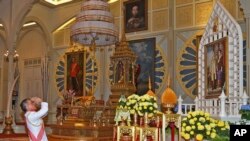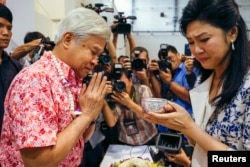Thailand’s newest constitution, signed into law by King Maha Vajiralongkorn, opens the way to new elections in late 2018.
Thursday’ elaborate signing ceremony marks a fresh bid to ensure a constitution that can be sustained. It’s the 20th charter since Thailand became a constitutional monarchy in 1932; past ones have been tossed out over years of political volatility and military coups.
Many experts on Thai politics, however, have doubts it will succeed.
This charter comes almost three years after the military seized power from the administration of Prime Minister Yingluck Shinawatra in May 2014.
Thailand has faced 21 coups or coup attempts since 1932; the 2006 coup that ousted Prime Minister Thaksin Shinawatra, Ms. Yingluck’s brother, has led to more than a decade of political tension in the country.
Voters approved the constitution in a referendum last year, and it was amended afterward to clarify the role of the monarch.
Military senators approved
The 250 senators, appointed by the military, and 500 elected members of the House of Representatives, also approved the charter. The two houses of parliament are empowered to select prime ministers.
While many political analysts in Thailand see the new constitution as a step forward, they warn that with the military in control of the Senate, political unrest may continue.
Titipol Pakdeewanich, a political scientist from Ubon Ratchathani University, says the military is now looking to elections as the next step.
“With this constitution, there’s no way that they wouldn’t be able to maintain their power and then – but by maintaining their power through a constitution within Thailand is not enough.
“For them, having an election is another thing that they really want to have so they can again speak to the West and gain more recognition,” Titipol said.
Role of political parties unclear
Political scientist Thitinan Pongsudhirak, in a newspaper commentary, said, “The bad news, however, is the likely recurrence of past election civil-military tensions and squabbles because the military has embedded its influence and supervision over Thai politics.”
He fears Thailand may waste “another decade on conflict and confrontation after years of polarization and relative inertia.”
The military government has imposed tough restrictions on political parties with no clear timeline or legal structure for when they will again be allowed to be active ahead of new elections.
Pandit Chanrochanakit, a political scientist at Chulalongkorn University, said the military’s challenge has been to step away from a leadership position in government since taking power in 2014.
“The hardest problem for every junta is the withdrawal – how they can make a peaceful transition without having any trouble,” Pandit told VOA.
He said the leading political parties, the Pheu Thai Party linked to Yingluck Shinawatra and the Democrat Party, both are dealing with internal divisions over leadership.
Analysts say already some key military leaders in the government are looking to political party backing ahead of the national polls; if they are elected to represent parties, it gives the military even more control.
Some analysts say the new constitution is disdainful of voters.
“That the constitution is not a very democratic one is a concern. It’s hard to believe that this would restore democracy in Thailand, because from my personal opinion it undermines – at least – ‘one man one vote,” Titipol said.
“It doesn’t stack up with treating everyone equally. So when the constitution is not democratic, how can you expect democracy in a country?” he said.
The constitution allows the parliament to select a prime minister who had not been elected to a parliamentary seat, analysts note.
Chulalongkorn University’s Pandit says this raises fears of a repeat of the political protests in 1992 against Prime Minister Suchinda Kraprayoon, who was put in place by the military.
Suchinda was forced to resign after three days of bloodshed that left at least 50 people dead and hundreds wounded.
“The 1992 uprising [occurred] because we don’t want a non-representative to be the prime minister. So this would be the next challenge for the junta,” Pandit said.
The protests ended when the late King Bhumibol Adulyadej intervened, forcing an end to the military’s control and opening a long period of democratic development.





